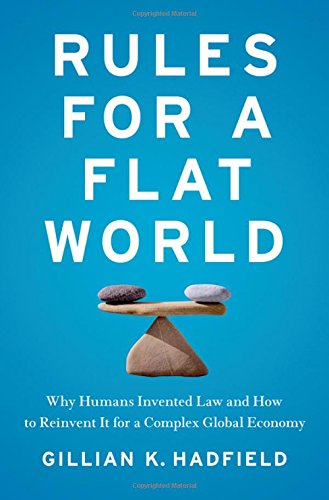(Ebook) Rules for a flat world: why humans invented law and how to reinvent it for a complex global economy by Hadfield, Gillian Kereldena ISBN 9780199916528, 0199916527
"If you want a simple representation of the twentieth-century economy, picture a large corporation as a box. To do the same for today's economy, though, we need to blow up that box and reassemble the pieces into a network. The network is global, stretching across the planet untethered to political and legal boundaries. This is the economy of the twenty-first century, characterized by ever-expanding global supply
chains and communication systems. In 2005, Thomas Friedman reduced this phenomenon to one phrase, the title of his massively successful book: The World is Flat. Of course, the phrase is misleading. The world may be getting flatter in some places, but there are still many factors that tilt the odds in favor of some locations over others. Law and economics professor Gillian Hadfield picks up where Friedman's book left off, by peeling back the technological layer to look at what lies beneath-our legal infrastructure-and argues that the outdated legal system is, in fact, largely responsible for our still-slanted world. Put simply, the law and legal methods on which we currently rely have failed to evolve along with technology. Hadfield argues that not only are these systems too slow, costly, and localized to support economic complexity, they also fail to address looming challenges such as global warming, poverty, and oppression in developing countries. The answer, however, is not the one critics usually reach for-to have less of it. Through a sweeping review of law and the world economy over thousands of years, Hadfield makes the case for building a legal environment that does more of what we need it to do and less of what we don't. Hadfield offers, in engaging and accessible prose, a model for a more market- and globally-oriented legal system. Combining an impressive grasp of economic globalization with an ambitious re-envisioning of our global legal system, Rules for a Flat World will transform our understanding of how to best achieve a more sustainable and vibrant global economy."--"The law and legal methods on which we currently rely have failed to evolve along with technology. In Rules for a Flat World, Gillian Hadfield shows us that law provides critical infrastructure for the cooperation and collaboration on which economic growth is built. Recognizing the importance of this infrastructure, along with the insufficiencies of the current system, is the first step to building a legal environment that does more of what we need it to do and less of what we don't"--
Abstract: "If you want a simple representation of the twentieth-century economy, picture a large corporation as a box. To do the same for today's economy, though, we need to blow up that box and reassemble the pieces into a network. The network is global, stretching across the planet untethered to political and legal boundaries. This is the economy of the twenty-first century, characterized by ever-expanding global supply chains and communication systems. In 2005, Thomas Friedman reduced this phenomenon to one phrase, the title of his massively successful book: The World is Flat. Of course, the phrase is misleading. The world may be getting flatter in some places, but there are still many factors that tilt the odds in favor of some locations over others. Law and economics professor Gillian Hadfield picks up where Friedman's book left off, by peeling back the technological layer to look at what lies beneath-our legal infrastructure-and argues that the outdated legal system is, in fact, largely responsible for our still-slanted world. Put simply, the law and legal methods on which we currently rely have failed to evolve along with technology. Hadfield argues that not only are these systems too slow, costly, and localized to support economic complexity, they also fail to address looming challenges such as global warming, poverty, and oppression in developing countries. The answer, however, is not the one critics usually reach for-to have less of it. Through a sweeping review of law and the world economy over thousands of years, Hadfield makes the case for building a legal environment that does more of what we need it to do and less of what we don't. Hadfield offers, in engaging and accessible prose, a model for a more market- and globally-oriented legal system. Combining an impressive grasp of economic globalization with an ambitious re-envisioning of our global legal system, Rules for a Flat World will transform our understanding of how to best achieve a more sustainable and vibrant global economy."--
"The law and legal methods on which we currently rely have failed to evolve along with technology. In Rules for a Flat World, Gillian Hadfield shows us that law provides critical infrastructure for the cooperation and collaboration on which economic growth is built. Recognizing the importance of this infrastructure, along with the insufficiencies of the current system, is the first step to building a legal environment that does more of what we need it to do and less of what we don't"
*Free conversion of into popular formats such as PDF, DOCX, DOC, AZW, EPUB, and MOBI after payment.


